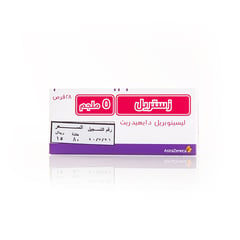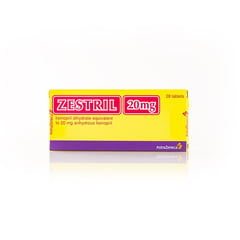What Lisinopril is used for
It can be used for the following conditions:
• To treat high blood pressure (hypertension).
• To treat heart failure.
• If you have recently had a heart attack (myocardial infarction).
• To treat kidney problems caused by Type II diabetes in people with high blood pressure.
It works by making your blood vessels widen. This helps to lower your blood pressure. It also makes it easier for your heart to pump blood to all parts of your body.
Do not take Lisinopril
• if you are allergic to lisinopril or any of the other ingredients of this medicine
• if you have ever had an allergic reaction to another ACE inhibitor medicine.
• If you have taken or are currently taking sacubitril/valsartan, a medicine used to treat a type of long-term (chronic) heart failure in adults, as the risk of angioedema is increased.
• if a member of your family has had severe allergic reactions (angioedema) to an ACE inhibitor or you have had severe allergic reactions (angioedema) without a known cause.
• if you are more than 3 months pregnant.
• if you have diabetes or impaired kidney function and you are treated with a blood pressure lowering medicine containing aliskiren.
Warnings and precautions
Talk to your doctor or pharmacist before taking lisinopril if you:
• have a narrowing (stenosis) of the aorta or a narrowing of the heart valves (mitral valves).
• have a narrowing (stenosis) of the kidney artery.
• have an increase in the thickness of the heart muscle.
• have problems with your blood vessels.
• have low blood pressure.
• have kidney problems or you are having kidney dialysis.
• have liver problems.
• have diabetes.
• are taking any of the following medicines used to treat high blood pressure: an angiotensin II receptor blocker (ARBs), aliskiren
• have recently had diarrhoea or vomiting.
• have high levels of cholesterol and you are having a treatment called ‘LDL apheresis’.
• are of black origin as lisinopril may be less effective.
• are taking any of the following medicines: temsirolimus, sirolimus, everolimus, vildagliptin.
Possible side effects
These include headache, feeling dizzy or light-headed, especially if you stand up quickly, diarrhea, a dry cough that does not go away, being sick (vomiting), kidney problems (shown in a blood test).
Other medicines and Lisinopril
Tell your doctor or pharmacist if you are taking:
• Other medicines to help lower your blood pressure.
• An angiotensin II receptor blocker (ARB) or aliskiren.
• Water tablets (diuretic medicines).
• Beta-blocker medicines, such as atenolol and propranolol.
• Nitrate medicines (for heart problems).
• Non-steroidal anti-inflammatory drugs (NSAIDs) used to treat pain and arthritis.
• Aspirin (Acetylsalicylic acid), if you are taking more than 3 grams each day.
• Medicines for depression and for mental problems, including lithium.
• Potassium supplements.
• Insulin or medicines that you take by mouth for diabetes.
• Medicines used to treat asthma.
• Medicines to treat nose or sinus congestion or other cold remedies (including those you can buy in the pharmacy).
• Medicines to suppress the body’s immune response.
• Allopurinol (for gout).
• Procainamide (for heart beat problems).
• Medicines that contain gold.
How to take Lisinopril
Adults
• For high blood pressure: the recommended starting dose is 10 mg once a day. The usual long-term dose is 20 mg once a day.
• For heart failure: the recommended starting dose is 2.5 mg once a day. The long-term dose is 5 to 35 mg once a day.
• After a heart attack: the recommended starting dose is 5 mg within 24 hours of your attack and 5 mg one day later. The usual long-term dose is 10 mg once a day.
• For kidney problems caused by diabetes: the recommended dose is either 10 mg or 20 mg once a day. If you are elderly, have kidney problems or are taking diuretic medicines your doctor may give you a lower dose than the usual dose.
Children and adolescents (6 to 16 years old) with high blood pressure
• This medicine is not recommended for children under 6 years or in any children with severe kidney problems.
• For children who weigh between 20 kg and 50 kg, the recommended starting dose is 2.5 mg once a day.
• For children who weigh more than 50 kg, the recommended starting dose is 5 mg once a day.
How to store Lisinopril
Keep this medicine out of the sight and reach of children.
• Do not use this medicine after the expiry date (EXP) which is stated on the blister strip and the carton. The expiry date refers to the last day of that month.
• 5 mg, 10 mg and 20 mg tablets: Do not store above 30°C.
• Do not throw away any medicines via waste-water or household waste. Ask your pharmacist how to throw away medicines you no longer use. These measures will help protect the environment. A valid prescription should be available upon delivery
| Shipping Type | Express |
|---|
Write Your Own Review
The largest selection of casino games and sports bets at 1xbet app.






